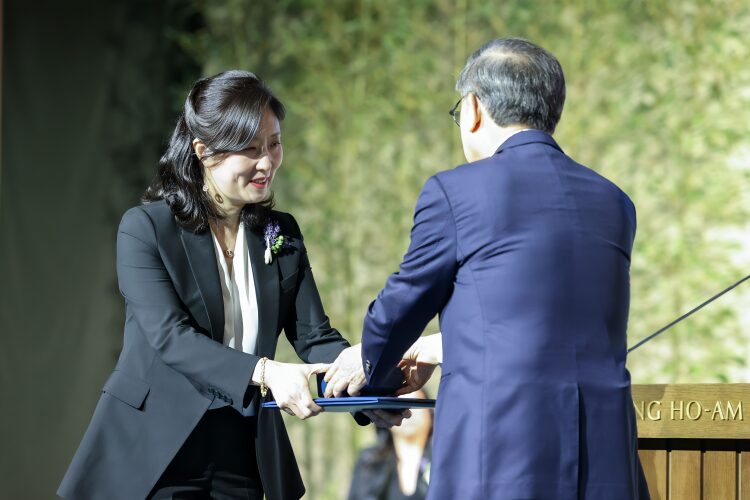
Alumna Su-In Lee (Class of ’97), Paul G. Allen Professor at the Allen School of Computer Science & Engineering, University of Washington, was selected in April 2024 as the recipient of the ‘Samsung Ho-Am Prize’ in Engineering. This marks a significant milestone as Professor Lee is the first female recipient in the Engineering category since the establishment of the prize in 1990.
Professor Lee was recognized for her contributions to the field of “Explainable AI,” particularly for developing the “SHAP” methodology, which advances understanding and trust in AI predictions and decisions.
Professor Lee remarked, “Through explainable AI, I aim to unlock the keys to solving critical biological problems and addressing rare diseases using vast big data.”
At the award ceremony on May 31, she expressed her aspirations: “I sincerely hope that many will be inspired by my receipt of the Ho-Am Prize and my research in AI to pursue careers in engineering, tackle challenging problems through bold research, and contribute to making the world a better place by addressing critical issues faced by science, medicine, society, and humanity.”
We are delighted to share the great news about our alumnus with the members of our department, albeit belatedly. Below is the full text of Professor Su-In Lee’s acceptance speech, which serves as an inspiring message of great challenge for future generations. Please find her full speech below.
And the video featuring an introduction to Professor Su-In Lee’s research achievements and the award ceremony can be viewed at the link below.
: https://youtu.be/yRhDcrj_Z14?t=2255
|
< Acceptance speech from Professor Su-In Lee > First and foremost, it is a tremendous honor for someone as young as I am, with many goals still to achieve, to receive the Samsung Ho-Am Prize in Engineering.
I sincerely thank everyone who has supported me on this journey. I wish to express my gratitude to my late father, who could not be here due to a disease that exceeded the limits of modern medicine, my beloved mother, and all my cherished family members. I am also deeply grateful to my mentors, friends, colleagues, and all the students who have joined me on this research journey.
I believe that awards are always given to one among many deserving individuals. Therefore, I feel that the chosen recipient bears a responsibility greater than the privilege of the award itself. To me, the true meaning of this award lies not in the honor of the prize but in the messages, I convey and the impact I create by standing here today.
With that in mind, I would like to share some thoughts with you. As a professor and scientist, one of the most fulfilling aspects of my work is inspiring younger generations and influencing their lives. I genuinely hope that many will be inspired by my receipt of the Ho-Am Prize and my research in explainable AI to pursue careers in engineering, conduct bold research, and contribute to solving critical problems in science, medicine, society, and humanity.
We are witnessing how AI is dramatically transforming humanity and the world. In this rapidly changing era, there is no such thing as a “comfortable” or “secure” job. Instead, find work and a career path that makes your heart race until retirement and beyond.
If you choose science or engineering as your career path, I encourage you not to limit yourself to books and papers but to gain a wide range of experiences. Modern science is a team effort. Securing research funding, recruiting excellent team members, and effectively promoting your research results are all crucial skills.
Thus, a great scientist must also be a good “politician,” making diverse life experiences essential. And always remember the essence of research. The goal of research is not to publish papers in prestigious journals, obtain a Ph.D., or secure a job offer.
The ultimate purpose of science and engineering is to expand the boundaries of human knowledge and capability and, ultimately, to create a better world for humanity. Focus on the future and intrinsic value rather than immediate achievements. Concentrate only on the ideas, methodologies, and data that most effectively expand the limits of human knowledge and ability.
Success follows when you pursue these goals. With such fundamental principles, you can genuinely celebrate the achievements of others, set your own standards for evaluating research, and navigate the challenges of research and life. When you encounter difficulties, focus only on what you can control and do not waste time on things beyond your reach. Also, if there is something inevitable, learn to embrace and enjoy it.
At this moment, I think of all the young girls and boys who might be inspired by me to become scientists or engineers. To them, I say: Never lose your curiosity, never fear challenges, and always strive toward the right goals. You can overcome any obstacle and achieve your dreams. Thank you.
|